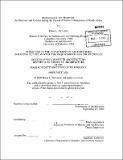Mediterraneità and modernità : architecture and culture during the period of Italian colonization of North Africa
Author(s)
McLaren, Brian L. (Brian Lloyd), 1958-
DownloadFull printable version (88.39Mb)
Alternative title
Architecture and culture during the period of Italian colonization of North Africa
Other Contributors
Massachusetts Institute of Technology. Dept. of Architecture.
Advisor
Mark Jarzombek.
Terms of use
Metadata
Show full item recordAbstract
This dissertation examines the intersection of the modern and the colonial in architecture and culture during the period of Italian colonization of North Africa from 1911 to 1943. Rather than see the colonies as merely a projection of the metropolitan context, this research reverses this relationship by examining how colonialism was crucial to the formation of modernity. The focus of this investigation has been the appropriation of indigenous Libyan constructions by Italian architects working in this region - an appropriation that was justified by the contention that this culture was Mediterranean. The incorporation of these vernacular buildings within a Mediterranean tradition was a means of designating their modernity. It was also a method for these architects to efface the Arab content of these sources by creating a broader geographical category whose identity was Italian. This general theme has been structured around three distinct but interrelated topics of investigation, with the objective being to create a more complex understanding of this phenomenon. These topics are; the discourse on modernity in Italian architecture in magazines and publications and its intersection with the prospects for a modern colonial architecture, the "politics of representation" of the indigenous culture of Italy's colonies in exhibitions and fairs in Italy and abroad, and the formation of a Mediterranean identity in the creation of a tourist system in the · Libyan colonies. This research has examined these themes against the broader cultural context of Italian colonialism; such as the "indigenous politics" of the Italian colonies, the exoticism of colonial literature, and the scientific practices of anthropological and ethnographic research. This project ultimately reveals two different approaches to the appropriation of local culture by architects working in the Libyan colonies - both of which are modern. The first of these viewed the vernacular as the abstract basis for a contemporary architecture, while the second argued that these references should be literally re-enacted to harmonize with the pre-existing environment. This dissertation asserts that the conflicts and confluences between these two modernities characterized both the architecture of colonialism and the larger "cultural" project of the Italians in Libya.
Description
Thesis (Ph.D.)--Massachusetts Institute of Technology, Dept. of Architecture, February 2001. Includes bibliographical references (p. 451-480).
Date issued
2001Department
Massachusetts Institute of Technology. Department of ArchitecturePublisher
Massachusetts Institute of Technology
Keywords
Architecture.